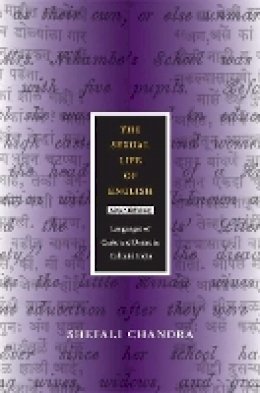
Stock image for illustration purposes only - book cover, edition or condition may vary.
The Sexual Life of English: Languages of Caste and Desire in Colonial India
Shefali Chandra
€ 46.06
FREE Delivery in Ireland
Description for The Sexual Life of English: Languages of Caste and Desire in Colonial India
Paperback. Uses English language education for women in India between 1850 and 1940 as a way to explore how and why the English language became a powerful tool in struggles over caste hierarchy. This book shows how elite men linked ideas of matrimony, chastity, and heteronormativity with modernity in order to claim power on a national level. Series: Next Wave: New Directions in Women's Studies. Num Pages: 192 pages. BIC Classification: 1FKA; 1QDB; 2AB; CFB; JFS. Category: (UP) Postgraduate, Research & Scholarly. Dimension: 231 x 155 x 18. Weight in Grams: 431.
In The Sexual Life of English, Shefali Chandra examines how English became an Indian language. She rejects the idea that English was fully formed before its life in India or that it was imposed from without. Rather, by drawing attention to sexuality and power, Chandra argues that the English language was produced through conflicts over caste, religion, and class. Sentiments and experiences of desire, respectability, conjugality, status, consumption, and fashion came together to create the Indian history of English. The language was shaped by the sexual experiences of Indians and by native attempts to discipline the normative sexual subject. Focusing on the years between 1850 and 1930, Chandra scrutinizes the English-education project as Indians gained the power to direct it themselves. She delves into the history of schools, the composition of the student bodies, and disagreements about curricula; the way that English-educated subjects wrote about English; and debates in English and Marathi popular culture. Chandra shows how concerns over linguistic change were popularly voiced in a sexual idiom, how English and the vernacular were separated through the vocabulary of sexual difference, and how the demand for matrimony naturalized the social location of the English language.
Product Details
Format
Paperback
Publication date
2012
Publisher
Duke University Press United States
Number of pages
192
Condition
New
Series
Next Wave: New Directions in Women's Studies
Number of Pages
288
Place of Publication
North Carolina, United States
ISBN
9780822352273
SKU
V9780822352273
Shipping Time
Usually ships in 7 to 11 working days
Ref
99-1
About Shefali Chandra
Shefali Chandra is Assistant Professor in the Department of History, the International and Area Studies Program, and the Women, Gender, and Sexuality Studies Program at Washington University in St. Louis.
Reviews for The Sexual Life of English: Languages of Caste and Desire in Colonial India
“This book is an indispensable reference for those interested in challenging the traditional discourse of national, imperial, and postcolonial histories. This engaging interrogation of the seductive efficiencies of the English language in India, from a postcolonial feminist perspective, turns the way we conceive of the language of the colonizer, in effect, inside out.” - Kristin Hutchins, Women’s Studies "The Sexual Life of English poses a significant challenge to modern Indian history, which has tended to take the links between language and culture and the gendered colonial self for granted, when engaging the latter at all. From now on, it will be impossible to grapple with liberalism, education, women, domesticity, class and caste, conjugality, nationalism, sexuality, and so much more without reckoning with Shefali Chandra's cogent, subversive arguments."—Antoinette Burton, author of Empire in Question: Reading, Writing, and Teaching British Imperialism "Shefali Chandra's rethinking of cultural theory and modern Indian history is remarkable. Her major thesis, that Indian English has a brutal and loving social history of sexualization, will set a model for analogous studies in other national traditions. Her breakthrough argument is that English acquisition produced male cultural authority through the installation of biosexual difference. The point, then, is not the phallogocentrism of English as English but rather the installation of a 'native' phallogocentric power in the processes of colonization and postcolonization. All those who have found wanting the orthodox position in the historiography of subaltern studies will find The Sexual Life of English an exhilarating read."—Tani E. Barlow, author of The Question of Women in Chinese Feminism
